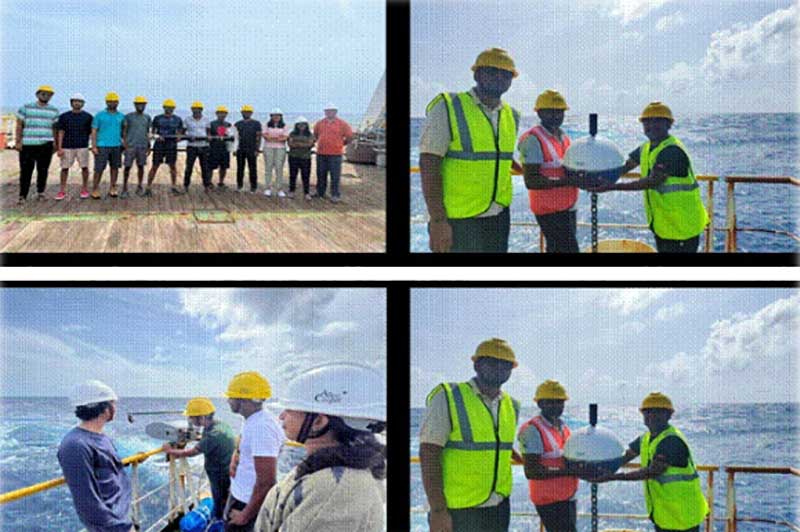 CSC
CSC India, Bangladesh, and Mauritius scientists participate in Joint Expedition which aim to build capacity in ocean observation
New Delhi: A joint expedition of ocean scientists from India, Bangladesh and Mauritius was organised by the Indian National Centre for Ocean Information Services (INCOIS), Ministry of Earth Sciences under the regional framework of Colombo Security Conclave (CSC) which concluded on Monday and aimed to build capacity in ocean observation.
"The primary objective of the expedition was to build capacity in ocean observation and services apart from collection of ocean data to predict and manage changes in the regional environment of the Indian Ocean," rean a statement issued by the Indian government.
The expedition onboard ORV Sagar Nidhi was unique in nature, as it was the first of its kind under the CSC framework; wherein the participants undertook collaborative activities such as measurement and modeling of ocean parameters, which would eventually lead to better forecast and services for the common benefit of all in the region.
Md Simul Bhuyan, the participating scientist from Bangladesh Oceanographic Research Institute (BORI), while sharing his experiences said, “Research expedition onboard Ocean Research Vessel Sagar Nidhi was a first of its kind experience for me. I never had experience working onboard such an advanced research vessel, as I worked onboard fishing boats and country boats. Though the weather was very rough, I had some wonderful experiences and learnings. All the scientists and crews were very supportive and I felt very comfortable working with Dr. Girishkumar. This research cruise will be a lifetime memory and experience for me.”
Murughen Sadien, the participating scientist from Mauritius Oceanography Institute while sharing his experiences, said, “As a physical oceanographer, specialised mainly in coastal areas, this expedition onboard of ORV Sagar Nidhi with the team of INCOIS has helped me to bridge my current knowledge and boost my curiosity of deep-sea processes and of the importance of various small scale mixing processes in the open and coastal ocean using Vertical Microstructure Profiler (VMP) and Lowered Acoustic Doppler Current Profiler (LADCP). To summarise, this expedition has been fruitful as this has helped me to acquire new techniques of data collection as well as in the design of an expedition. A special thanks to Jofia, Abhijeet and most importantly to Dr Girishkumar for the precious explanations regarding the theory and importance of the survey being undertaken.”
On completion of the maiden CSC Oceanographers Joint Expedition, T Srinivasa Kumar, Director INCOIS, said, “Oceanic and atmospheric state in the Arabian Sea plays significant role to determine the spatial and temporal variability of Monsoon Precipitation over India and near-by landmass. However, the role of small-scale turbulent mixing processes that determine the oceanic and atmospheric state in the Arabian Sea during the peak of summer monsoon is not clearly understood. As part of a month long EKAMSAT (Enhancing Knowledge of the Arabian Sea Marine Environment through Science and Advanced Training) cruise onboard Sagar Nidhi led by INCOIS, the scientists from INCOIS, India; MOI, Mauritius and BORI, Bangladesh worked together to collect precious oceanographic and atmospheric data in fine-scale scale resolution using vertical microstructure, eddy covariance flux measurements, L-ADCP, underway CTD (Underway Conductivity-Temperature-Depth Instrument) and Radiosonde during the extreme weather conditions in the Arabian Sea. These data surely provide new insights towards the small-scale mixing and atmospheric boundary layer dynamics during the summer monsoon in the Arabian Sea.”
Support Our Journalism
We cannot do without you.. your contribution supports unbiased journalism
IBNS is not driven by any ism- not wokeism, not racism, not skewed secularism, not hyper right-wing or left liberal ideals, nor by any hardline religious beliefs or hyper nationalism. We want to serve you good old objective news, as they are. We do not judge or preach. We let people decide for themselves. We only try to present factual and well-sourced news.







